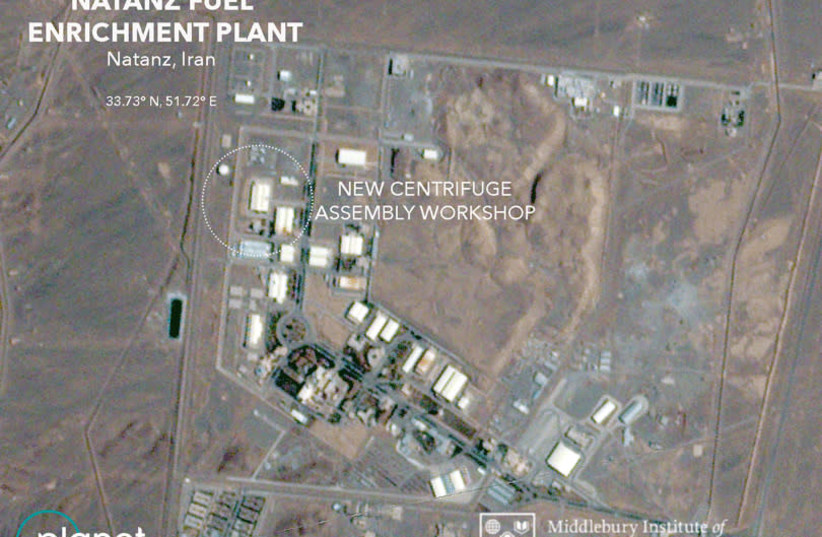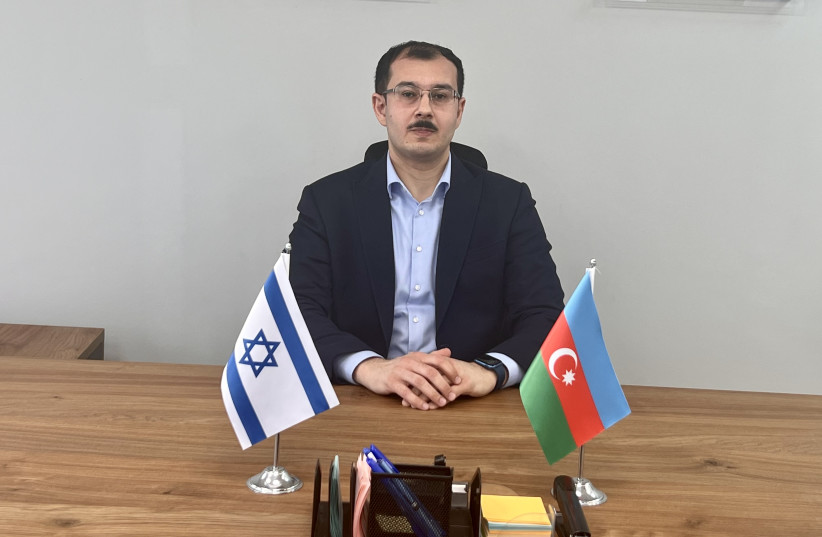Azerbaijani Ambassador-Designate to Israel Mukhtar Mammadov denied a report by Haaretz that the country has prepared an airfield to assist Israel.

The IDF won’t be allowed to use Azerbaijan as a refueling base during an attack against Iran, the country’s newly appointed ambassador to Israel, Mukhtar Mammadov, told The Jerusalem Post.
In the first interview he gave after arriving in Tel Aviv last week, ambassador-designate Mammadov denied foreign media reports reported by Haaretz earlier this month that the country had prepared an airfield meant to assist Israel in case it decides to attack Iranian nuclear sites, or had allowed the Mossad to set up a branch in Azerbaijan to monitor what is happening in Iran.
“Azerbaijan, from the start, has declared that it will not interfere in the internal matters of other countries and will not allow its territory to be used against other countries.”
Mukhtar Mammadov, Azerbaijan’s ambassador to Israel
“Azerbaijan, from the start, has declared that it will not interfere in the internal matters of other countries and will not allow its territory to be used against other countries,” the ambassador said. “This is because we expect other countries not to interfere in our internal matters.”
When pressed, “Are you saying those foreign media reports are false?” Mammadov said “yes.”
The ambassador was to have presented his credentials to President Isaac Herzog on Thursday, as speculation has heightened over the possibility of an Israeli military attack against Iran, since the Islamic Republic appears close to producing weapons-grade uranium. However, the meeting was pushed off to a later, undetermined date.

Mammadov was met in Israel with the lengthy report by the left-wing daily detailing the nearly 100 Azerbaijani Silk Way Airlines cargo flights that, over the last seven years, had landed at the Ovda Air Force Base, the only airfield in Israel through which explosives may be flown into and out of the country. The report claimed that Israel had provided its Muslim ally with weapons, including increased weapons during times of conflict between Azerbaijan and Armenia, in exchange for access to Iran.
Israel does not own any jets capable of traveling the roughly 1,900 km. necessary to strike targets in Iran and return, and would need to stop to refuel. Israel is slated to receive four KC-46 refueling planes that could solve the challenge, but they likely won’t be delivered until at least 2025.
Azerbaijan-Iran relations strained
AZERBAIJAN ENJOYED good relations with Iran until recently, with as many as six million Azerbaijani expats living in the country, according to the Unrepresented Nations and Peoples Organization. However, relations have been strained since Azerbaijan’s victory against Armenia in 2020, with Iran carrying out military exercises on Azerbaijan’s border. Mammadov said that when Armenia occupied Nagorno-Karabakh, “we had not seen even a single Iranian military exercise on those locations.”
Then, on January 27, a gunman opened fire at the Azerbaijan Embassy in Tehran, killing a security guard and wounding two others. Azerbaijan deemed it an act of terrorism and shut down operations at the location until a thorough investigation would be conducted. But, Mammadov said, “it is not difficult to assume that person aimed to get upstairs [where the diplomats and their families were living], and that if that had happened, we would have had many more casualties.”
He stressed that the decision to bring the diplomats home was not meant to sever ties with Iran.
Regarding the number of weapons Azerbaijan has purchased from Israel or the number of planes that transported them from Israel, Mammadov said he did not have data on the exact number. However, he confirmed that Israel is one of the country’s leading arms suppliers.
A Stockholm International Peace Research Institute report said Israel accounted for 27% of Azerbaijan’s imports of major arms between 2011 and 2020. However, most deliveries occurred between 2016 and 2020, when Israel accounted for 69% of Azerbaijan’s significant arms imports.
According to the report, Russia, Turkey and Belarus were other top suppliers.
Mammadov said he did not understand concerns about Azerbaijani weapon purchases from Israel.
“Every country is responsible for the protection and defense of their territorial integrity and the sovereignty of their citizens,” Mammadov said. “Azerbaijan is no exception.
“Israel also produces a lot of weapons, so purchasing these weapons from Israel is normal.”
When asked whether these weapons helped the country regain its territory during the 2020 war with Armenia, Mammadov said Azerbaijan’s victory resulted from strategic military leadership by President Ilham Aliyev and the army’s capabilities, weaponry and training.
“We’ve been accused of spending a lot of money on the military, and we replied that the world had not helped us settle the conflict [with Armenia],” Mammadov said. “If there is no conflict, no occupation, and no threat to our territories and citizens, then we would not be spending so much on our military. If you look at the global map, those countries living in safe neighborhoods spend less. We, unfortunately, don’t have that luxury.”
The 2020 war lasted more than 30 days until Armenia ultimately ceded the territory it had occupied since 1994 on November 10. Many analysts attributed Azerbaijan’s victory to its stealth use of drones, sensors and long-range, precise missile strikes. However, they also highlighted that the war may have been more prolonged and more deadly without the advanced Israeli systems that Azerbaijan reportedly acquired. Moreover, as Mammadov noted, there is no reason to believe that the use of Israeli arms was any different or worse than the use of weapons acquired from other countries.

ALTHOUGH THE war has ended, Azerbaijan continues to experience ceasefire violations “on a daily and sometimes even hourly basis,” Mammadov told the Post. In one incident earlier this week, Azerbaijani troops and ethnic Armenians exchanged gunfire, killing at least five people, according to reports from both sides.
Mammadov said Azerbaijan has already invested more than $3 billion in reconstruction work in the Nagorno-Karabakh region and has earmarked another $1.5b. this year.
The biggest challenge is land mines, which riddle the territory. According to the ambassador, Armenia has yet to provide a map, making it dangerous to further repopulate the area. So far, he said, 69,441 hectares of land were cleared by the organizations involved in demining operations, and 82,991 mines and unexploded ordnance were detected and destroyed.
“Some international experts that we engaged have said we might need 30 years to fully demine the territories,” Mammadov added. “We don’t want war any more. We don’t want any further casualties. We want peace and stability and to invest more in our people’s lives – education, culture, technology – than in the military.”
On the other hand, Azerbaijan has been accused of blockading the Lachin corridor between Nagorno-Karabakh and Azerbaijan since December, cutting off as many as 120,000 ethnic Armenian residents still living in the area from essential goods and services and lifesaving healthcare, according to Amnesty International.
Mammadov denied the claim, saying that the road is closed only to the military, and accused Armenia of illegally transporting weaponry and military personnel into the territories.
According to Azerbaijani official numbers, between December 12, 2022, and February 26, 2023, 3,126 different means of transport crossed the Khankendi-Lachin road in both directions, including 2,734 vehicles belonging to the Russian Federation peacekeeping contingent.
AZERBAIJAN DECLARED independence in 1991, and Israel opened its embassy in Baku in 1993. In October last year, former defense minister Benny Gantz officially visited the country, meeting with his counterpart Zakir Hasanov and the president. Shortly after that trip, the decision to open the Azerbaijan Embassy in Tel Aviv was announced, and the embassy is officially opening now.
Why open an embassy now?
According to Mammadov, a lot has changed for Azerbaijan in recent decades. For example, last year, the country signed a memorandum of understanding with Europe for cooperation in the field of energy.
“We’re not only providing Europe with oil and gas, but we recently signed a new MOU for delivering [to] Europe electric energy, so we are also on the green energy track,” Mammadov said.
To date, Azerbaijan supplies Israel with around 65%-70% of its oil needs.
He added that Azerbaijan’s victory against Armenia was also a game changer.
While he could not say why he was chosen to be the first ambassador, Mammadov said he visited Israel five years ago in his previous role as chief of staff of the Education Ministry. Then, he helped spearhead collaboration with Israel in the field of education, including bringing dozens of Azerbaijani teachers to the region to be trained in the STEAM (science, technology, engineering, the arts and math) education approach. Today, the country has around 30 STEAM centers.
“Technology is the future of the economy,” Mammadov said. “We see from Israel, also known as the Start-Up Nation, how important it is to the broader society.”
He noted his involvement with Azerbaijan’s Jewish schools, which serve around 1,450 students, according to the most recent estimates by the World Jewish Congress.
According to Hebrew University demographer Sergio Della Pergola, between 7,800 and 16,000 Jews still live in Azerbaijan.
Mammadov spoke proudly about the local Jewish community, which dates back to the fifth century, and he said it has peacefully coexisted since then. While today Ashkenazi and Georgian Jews are also living in Azerbaijan, the first Jews were known as the “Mountain Jews” because they lived in the country’s extremely remote and mountainous areas. Their neighborhoods have become known as “the Jerusalem of the Caucasus.”
In February, Mammadov visited one of the Jewish day schools and planted trees for Tu Bishvat.
“When I tell Israelis about Jewish kids studying Hebrew in Baku, they get surprised,” he said with a smile. “In Baku, diversity is just our normal way of life.”
Mammadov said he has been greeted in Israel with a “warm welcome by everyone I meet.”
“We don’t consider opening an embassy in Israel an end goal,” he added. “It is just the beginning of the next page. We want the embassy to be an instrument for widening our relations in various fields – especially people-to-people contact.”
The ambassador noted that there are direct flights between Baku and Tel Aviv, and the number is expected to increase soon.
“We will welcome all Israelis and encourage them to visit Azerbaijan,” he said.
Content retrieved from: https://www.jpost.com/international/article-733935.